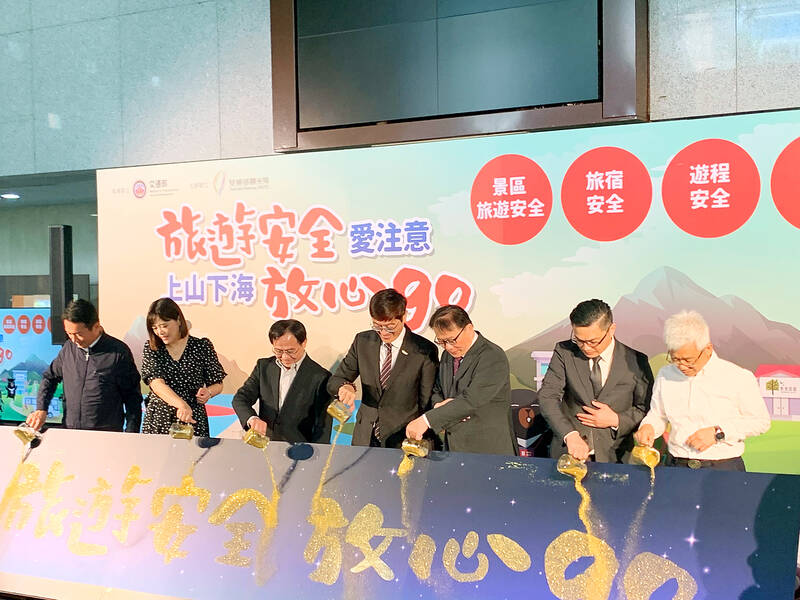A tourism program that would offer cash incentives to foreign nationals to visit Taiwan is scheduled to begin on April 15, but many aspects of the plan have not been finalized, Tourism Bureau Deputy Director-General Trust Lin (林信任) said yesterday.
The bureau plans to distribute 500,000 NT$5,000 vouchers to foreign nationals visiting Taiwan if they meet certain criteria, such as arriving individually and not as part of a tour group, Lin told a news conference to mark Travel Safety Awareness Week, which begins tomorrow.
The vouchers might be distributed through a lottery system, but the specifics are being discussed, Lin said.

Photo: Ting Yi, Taipei Times
It was also unclear whether business travelers would be eligible, or if the vouchers would only go to leisure travelers, he added.
Visitors would be able to use the vouchers — which could take the form of a stored-value card or other medium — for hotels, shopping, transportation and dining, the bureau previously said.
The bureau said it plans to also award travel agencies NT$10,000 for every tour group of eight to 14 travelers it brings to Taiwan, and NT$20,000 for larger groups, with up to 90,000 tour groups expected to receive a subsidy.
Taiwan is hoping to attract 6 million overseas visitors this year, the bureau said.
Lin said that by the end of this month, about 1 million foreign visitors are expected to have arrived in Taiwan since January.
In the three years prior to the COVID-19 pandemic, Taiwan averaged about 11.2 million overseas visitors per year, but those numbers plummeted to about 1.38 million in 2020, 141,000 in 2021 and 895,000 last year, including 302,100 in December.
Separately, Lin also urged the public to use only legal campsites when spending the night outdoors during their travels.
About 1,500 illegal campsites exist in Taiwan, although the bureau is working with operators to bring them up to code, he said.
Ten percent of each hectare of farmland or forest can be used as campground, but the area must not overlap with environmentally sensitive areas, the bureau said.
Local governments have been asked to search for illegal campsites and impose fines of NT$60,000 that can be repeatedly issued on operators who fail to comply, it added.
Additional reporting by Ting Yi

Alain Robert, known as the "French Spider-Man," praised Alex Honnold as exceptionally well-prepared after the US climber completed a free solo ascent of Taipei 101 yesterday. Robert said Honnold's ascent of the 508m-tall skyscraper in just more than one-and-a-half hours without using safety ropes or equipment was a remarkable achievement. "This is my life," he said in an interview conducted in French, adding that he liked the feeling of being "on the edge of danger." The 63-year-old Frenchman climbed Taipei 101 using ropes in December 2004, taking about four hours to reach the top. On a one-to-10 scale of difficulty, Robert said Taipei 101

Nipah virus infection is to be officially listed as a category 5 notifiable infectious disease in Taiwan in March, while clinical treatment guidelines are being formulated, the Centers for Disease Control (CDC) said yesterday. With Nipah infections being reported in other countries and considering its relatively high fatality rate, the centers on Jan. 16 announced that it would be listed as a notifiable infectious disease to bolster the nation’s systematic early warning system and increase public awareness, the CDC said. Bangladesh reported four fatal cases last year in separate districts, with three linked to raw date palm sap consumption, CDC Epidemic Intelligence

US climber Alex Honnold left Taiwan this morning a day after completing a free-solo ascent of Taipei 101, a feat that drew cheers from onlookers and gained widespread international attention. Honnold yesterday scaled the 101-story skyscraper without a rope or safety harness. The climb — the highest urban free-solo ascent ever attempted — took just more than 90 minutes and was streamed live on Netflix. It was covered by major international news outlets including CNN, the New York Times, the Guardian and the Wall Street Journal. As Honnold prepared to leave Taiwan today, he attracted a crowd when he and his wife, Sanni,

Two Taiwanese prosecutors were questioned by Chinese security personnel at their hotel during a trip to China’s Henan Province this month, the Mainland Affairs Council (MAC) said yesterday. The officers had personal information on the prosecutors, including “when they were assigned to their posts, their work locations and job titles,” MAC Deputy Minister and spokesman Liang Wen-chieh (梁文傑) said. On top of asking about their agencies and positions, the officers also questioned the prosecutors about the Cross-Strait Joint Crime-Fighting and Judicial Mutual Assistance Agreement, a pact that serves as the framework for Taiwan-China cooperation on combating crime and providing judicial assistance, Liang